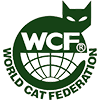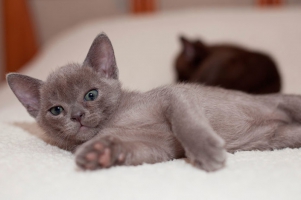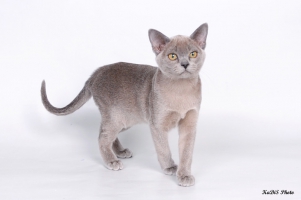Vaccination
8.1. Why vaccination is necessary
Vaccination is necessary to form active immunity in animals` organism that provides long (from several weeks till several years) protection against infectious diseases. The immunity received as a result of vaccination, is caused by formation of antibodies in cats organism which at next meeting with infectious agents eliminate the foreign protein, without harming the organism.
8.2. What is necessary to know about vaccines
Vaccines are differentiated on several categories. For example, there are vaccines monovalent (only against one disease) and polyvalent (containing antigenes against several agents). Valency can float from 1 to 6. Also vaccines are subdivided on killed or inactivate (containing only the neutralized viruses) and live (consisting of weakened strains of agents). It is necessary to notice that live vaccines form more intense and proof immunity in comparison with the killed.
8.3. Main principles of cats vaccination
The task of any vaccinal prophylaxis – to create steady immunity at the earliest age.
But the matter is that newborn kittens within first one and a half months of life has an active so-called colostric or parent immunity. Parent antibodies get to an organism of kids with a colostrum and are the insurance presented by the mother-nature during the most vulnerable period of life of a kitten. But there is also reverse of the coin – colostric antibodies don't let the own kitten's immunity to form, therefore it is advisably to begin the vaccination on achievement of 8 week age.
It is possible to vaccinate only healthy, free from parasites animals. Therefore preventive deworming (disposal of worms) is made before vaccination. In case of ctenocephalides presence (fleas, louses, pincers) the animal should be relieved from them before deworming. It is possible to vaccinate a kitten 3 days after antihelminthic medicine.
Primary vaccination of kittens against panleukopenia, calizivirose, rhinotracheitis is made with an obligatory revaccination in 2-4 weeks (exact terms depend on a kind of intake vaccine). Steady immunity to infections starts to form only 10-14 days after vaccination, and during this period the organism of a kitten is weakened and is more sensitive to infection. And full immunity to infections appears after 14 days from the moment of revaccination, i.e. two weeks after repeated intake of a vaccine.
Later, to support the immunity, cats are revaccinated annually.
Against rabies the kittens are vaccinated, since 12-week age and, as a rule, a vaccine is intaken one time, with the subsequent annual revaccination.
In 2-3 weeks after the end of vaccination from infectious diseases, it is possible to start to vaccinate a kitten from dermatomycosls (fungous diseases). A vaccine is intaken twice, with an interval of 10-14 days and is repeated once a year.
It is necessary to consider that, despite the presence of parent antibodies, the kitten can catch an infection and be ill in earlier time. Therefore, if you get an unvaccinated kitten before the end of vaccination it is necessary to isolate it from possible sources of an infection (other cats, street footwear etc.).
It is desirable also within at least 10 days after vaccination not to subject a kitten to big physical activities, overcooling and overheat, and also contacts to other animals, long and tiresome transportations.
Programming - Webstudio73.com











